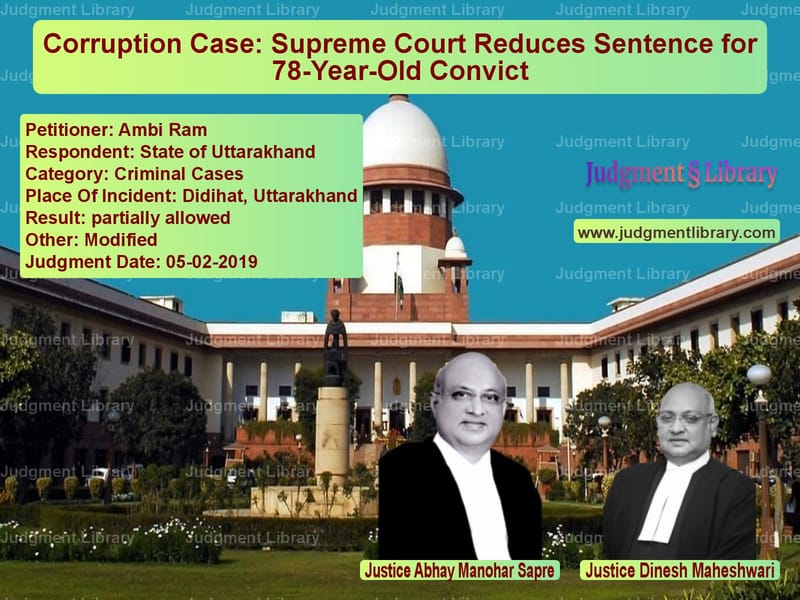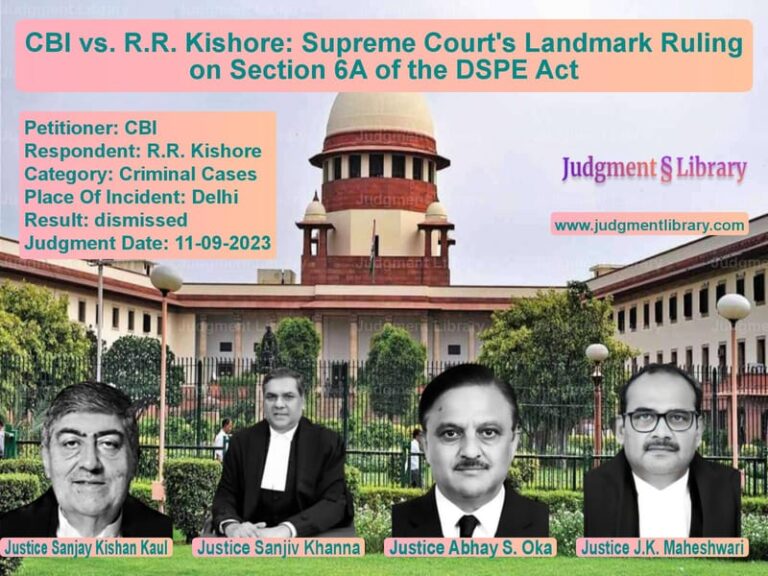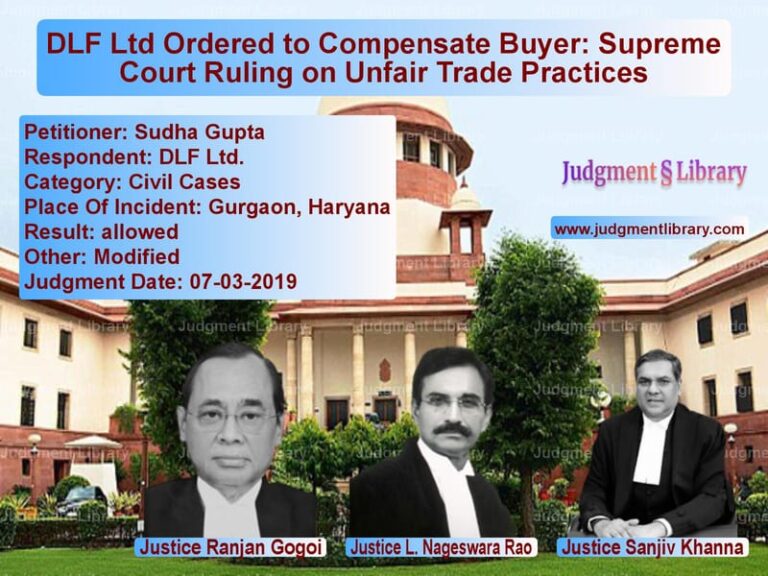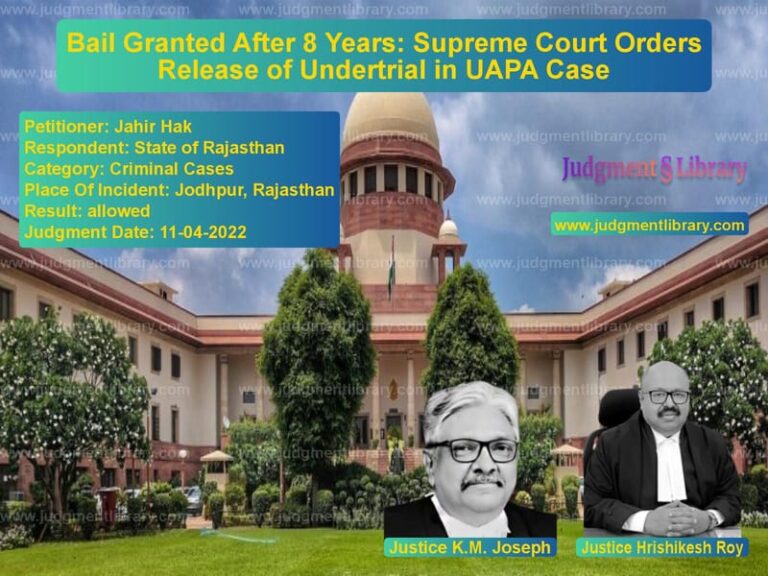Corruption Case: Supreme Court Reduces Sentence for 78-Year-Old Convict
The Supreme Court of India recently ruled on an appeal in the case of Ambi Ram vs. State of Uttarakhand, involving charges under the Prevention of Corruption Act, 1947. The case centered on a government official accused of accepting a bribe of Rs. 1200 in 1985. While the conviction was upheld, the Supreme Court, considering various mitigating factors, significantly reduced the sentence, demonstrating a balanced approach between punishment and leniency.
Background of the Case
Ambi Ram was employed as a Kanoongo/Patwari in Didihat, Uttarakhand. He was accused of demanding and accepting a bribe of Rs. 1200 from one Gopal Singh on September 30, 1985. The prosecution claimed that the bribe was sought in exchange for not implicating Gopal Singh in an ongoing criminal case.
A trap was set up by the Vigilance Department, and Ambi Ram was caught red-handed while accepting the bribe. He was subsequently arrested and prosecuted under Section 5(2) of the Prevention of Corruption Act, 1947, read with Section 161 of the Indian Penal Code (IPC).
Trial Court’s Decision
The Sessions Judge, Pithoragarh, found Ambi Ram guilty and sentenced him to:
- Four years of rigorous imprisonment under Section 5(2) of the Prevention of Corruption Act.
- A fine of Rs. 5000, with a default penalty of one additional year of imprisonment.
- Three years of rigorous imprisonment under Section 161 IPC.
The sentences were to run concurrently.
High Court Appeal
Ambi Ram appealed to the Uttarakhand High Court, which partially allowed the appeal on May 14, 2009. The High Court:
- Upheld the conviction under Section 5(2) of the Prevention of Corruption Act.
- Reduced the sentence from four years to one year.
- Reduced the fine from Rs. 5000 to Rs. 3000, with a default penalty of three months of imprisonment.
- Reduced the sentence under Section 161 IPC from three years to one year, to run concurrently with the other sentence.
Arguments Before the Supreme Court
In his appeal before the Supreme Court, Ambi Ram did not contest his conviction. Instead, his counsel argued for further reduction of the sentence based on the following grounds:
- Ambi Ram was 78 years old at the time of appeal.
- He was suffering from a heart ailment and other age-related health issues.
- The case was 34 years old, and he had already undergone the trauma of prolonged litigation.
- He had already served one month and 10 days in jail.
- He had maintained good conduct and had not committed any offenses in the past 34 years.
The defense requested that the Court invoke the proviso to Section 5(2) of the Prevention of Corruption Act, which allows the Court to impose a sentence of less than one year for special reasons.
Supreme Court’s Analysis and Judgment
The Supreme Court considered various factors, including the passage of time, the petitioner’s advanced age, and the fact that he had already suffered the consequences of legal proceedings for over three decades.
The Court observed:
“Given the fact that the trial and appeal proceedings have continued for nearly 34 years, causing immense trauma, mental anguish, and distress to the appellant, and also given the fact that the bribe amount was just Rs. 1200, the reduction of the sentence is justified.”
Referring to previous judgments, the Court stated:
“In cases involving minor bribery amounts and prolonged litigation, courts have previously reduced sentences where special circumstances exist.”
Consequently, the Supreme Court:
- Reduced the jail sentence to “what has already been undergone” (one month and 10 days).
- Increased the fine amount from Rs. 3000 to Rs. 10,000.
- Ordered that failure to pay the fine would result in one month of simple imprisonment.
Impact of the Judgment
The judgment in Ambi Ram vs. State of Uttarakhand highlights several important aspects of sentencing in corruption cases:
- Judicial Discretion in Sentencing: The case reinforces the principle that courts can exercise discretion in reducing sentences based on age, health, and the passage of time.
- Prolonged Litigation Considerations: The ruling acknowledges the burden of long-drawn legal battles on the accused.
- Proportionality in Punishment: The Court balanced the need for punishment with the need to consider humanitarian grounds, particularly in old cases.
- Monetary Penalty Over Incarceration: The Court emphasized fines over prolonged imprisonment in minor corruption cases.
Conclusion
The Supreme Court’s decision in Ambi Ram vs. State of Uttarakhand sets a precedent in cases where prolonged litigation and old age are factors in sentencing. By reducing the imprisonment period but enhancing the fine, the Court ensured that justice was served while taking into account the unique circumstances of the case. This judgment serves as an important reference for courts dealing with similar cases involving corruption charges against elderly individuals.
Petitioner Name: Ambi Ram.Respondent Name: State of Uttarakhand.Judgment By: Justice Abhay Manohar Sapre, Justice Dinesh Maheshwari.Place Of Incident: Didihat, Uttarakhand.Judgment Date: 05-02-2019.
Don’t miss out on the full details! Download the complete judgment in PDF format below and gain valuable insights instantly!
Download Judgment: Ambi Ram vs State of Uttarakhand Supreme Court of India Judgment Dated 05-02-2019.pdf
Direct Downlaod Judgment: Direct downlaod this Judgment
See all petitions in Fraud and Forgery
See all petitions in Extortion and Blackmail
See all petitions in Judgment by Abhay Manohar Sapre
See all petitions in Judgment by Dinesh Maheshwari
See all petitions in partially allowed
See all petitions in Modified
See all petitions in supreme court of India judgments February 2019
See all petitions in 2019 judgments
See all posts in Criminal Cases Category
See all allowed petitions in Criminal Cases Category
See all Dismissed petitions in Criminal Cases Category
See all partially allowed petitions in Criminal Cases Category







